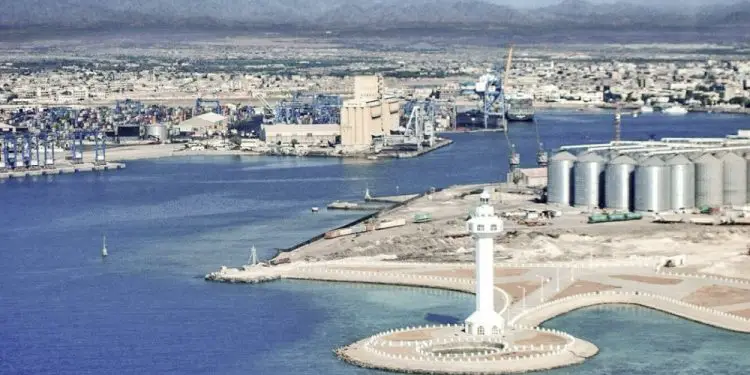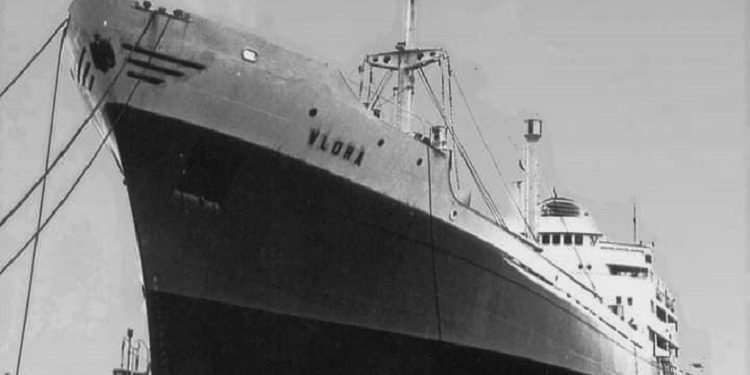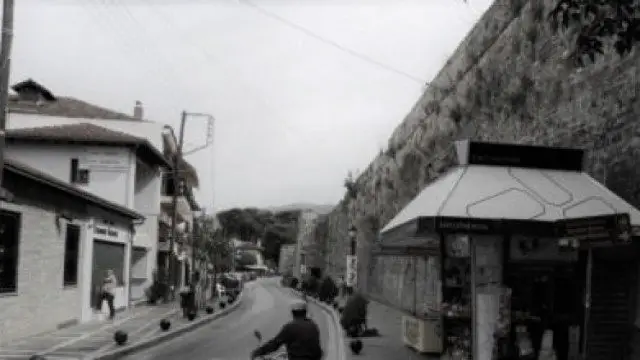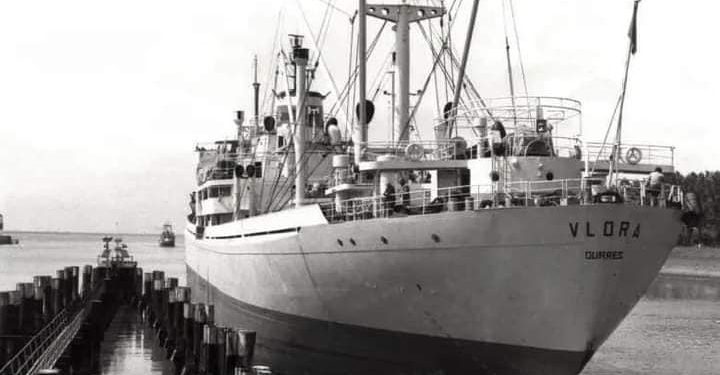By Maksim Rakipaj
Part thirty one
Memorie.al/ Maksim Rakipaj, originally from Përmet, whose family had helped and supported the Anti-Fascist National Liberation War, after graduating from the Navy School in Vlorë, in 1972 he was appointed an officer in the Merchant Navy, where he served with dedication until in 1977, on the “Durrësi” steamer, he was arrested and sentenced to 15 years in political prison, as part of a “group”, which also included his colleague, Aladin Kapo, the son of Hysni Kapo’s brother. Family biography was also the reason for his punishment. After the end of the war, two of his uncles were sentenced to political prison, his grandfather was declared a kulak and in 1976, his father was expelled from the party. Maksi began serving his sentence in the Ballsh camp and in 1979, he was transferred to the Spaçi camp and then to the Qafë Bari camp. He was released on September 12, 1984, benefiting from a reduced sentence, from an amnesty. After being unemployed for a long time, with many hardships, he got a job as a miner in the Mzezet mine, he worked until 1991. After the 1991s, he started working in the administration of the Municipality of Durrës, he served until 1997 and after that, he returned to the Merchant Navy (the last captain of the transoceanic ship “Vlora”), until he left Albania for Italy, (illegally on a dinghy), where he currently lives for many years. Since the 90s, in addition to various jobs, Maksim Rakipaj has also devoted himself to writing, such as; poetry, prose, fiction or documentary, translations, etc., publishing several books, such as: ‘Prophet – Khalil Gibran’, (translation from English ‘Toena’ 2003), ’20 love poems and a song of sadness’, (translation from Spanish, ‘Toena’ 2003), ‘Alive after the shipwreck’, (published by ISKK, 2014), ‘Bukowski – poetry’, (translation from English, ‘ENEAS’, 2015), ‘Trilusa m’Tirône’, ( translation from Italian, ‘UEGEN’, 2015), ‘Anthology of Arabic-Persian Poetry’ (English translations, ‘UEGEN’, 2015), ‘The Complete Sonnets of Shakespeare’, (English translation, ‘ADA’ 2016′) , ‘Survivor’ (autobiographical novel, ‘2 East, 2 West’ 2018), ‘Nobelists – poetic anthology, (UEGEN 2019), ‘Hymn of happiness’ (‘JOZEF’ 2023), etc. From the creativity of Mr. Rakipaj, Memorie.al is publishing the book “Survivor”, (published in 2022 by “JOZEF” Publishing House in Durrës, directed by Mr. Aurel Kaçulini), where he has described his life chronologically, where the part the main one is that of serving the sentence in camps and prisons, as well as various characters, his co-sufferers that he met in the communist hell, etc.
Continues from last issue
Greece, Ylliri, Ylliri or Albania?
In June 1993, I was on the ship “Vlora” in Sudan, the city also had the name; ‘Port Sudan’. We received an order from our agency in Switzerland to load 8,500 tons of sorghum, to be unloaded at a Turkish port, near the Bosphorus, in Tekirdag. Sorghum resembled the seeds of the broom plant and was used for poultry feed, but also for the production of beer.
The first day that our ship’s agent arrived at Port Sudan, he brought with him a long memorandum from the Swiss agency, enumerating all the dangers that could befall the ship from this kind of cargo; the main danger was that sorghum could spontaneously catch fire and many ships were mysteriously burned by this type of cargo.
It was the first time for me to load this kind of goods on a ship. In front of our ship, there was another big ship in the port, which had been loading the same cargo for two days. The agent told me that she was a Greek vessel and for several years had always loaded sorghum. I decided to meet the Greek captain, to learn from him the protective measures, to avoid the mysterious fire, which could come from the sorghum. On the Greek ship, I was met by the Greek nostromo, whose name was Athanasios.
With a surprisingly clean English for a Greek, he told me that there was neither the captain nor the first officer on the ship, but he was ready to give me all the information I needed; he took me to the waiting room and explained in detail what measures I had to take to avoid the fire. I thanked him for the clarifications and praised him for his English pronunciation; for a Greek it is impossible to pronounce, some English sounds, especially; “th”, “dh”, “ë”, etc. He blushed and smiled as if shyly and when we parted, he said to me:
– “It would be a pleasure for me, captain, if we could meet in the city.”
We met that evening in the streets of Port Sudan; someone touched my shoulder, I turned and saw Thanas, who spoke to me in pure Albanian:
– “Good evening Max, how are you?”
– “Thanasi?! Good evening Thanas! Where are you from? Are you Albanian?! Why didn’t you speak Albanian to me when we met on the ship this morning?!
– “I didn’t speak to you in my language, because I was afraid to speak in Alvanos, even the captain is afraid to speak…! They cut your bread in Greece, you speak Albanian. I’m an Arvanite from Corinth, the captain is from Elefsina, he hired me here and he loves me a lot, I do his work, we’re also of the same blood, an Arvanite as he was… and he…! What can I tell you…?! More than half, they spoke their language in Greece, they are afraid to express themselves and say; “I am Arvanit”, because they are left without work, without bread and the children want to eat brother…”!
Unbelievable! In a European state, people are afraid to declare their national affiliation, because they have to face the consequences, medieval persecutions! I was in Greece, in Elefsina, with the ship “Durresi” in 1976. I remember once on the bus to Athens, we were 5-6 sailors, talking to each other, when suddenly some young men approached us, smiling:
– “Even we spoke to this deaf like you, we are Arvanites, we are one blood…”!
Even inside Athens, in those days, it was impossible to speak Albanian and not feel the friendly glances and smiles of passers-by. But then Greece was not part of the European Community. Whereas in Calabria and Sicily, where there is an Arber community, the signs are bilingual: Italian-Albanian, there are schools and even a university in the Albanian language. When will the day come that even the Arvanites have these basic human rights in a modern, European state like today’s Greece?! And our politicians, why don’t they feel it?!
After some years, more or less the same thing happened to me. This time in the port of Evia, in Greece. We arrived with the ship “Vlora” there, with a cargo of cotton, from the West African port of Cotonou. The first of the port authorities to come aboard was the customs officer. He was in his forties, dark-skinned and with reddish hair; could be Scottish, Irish, Albanian, only Greek no! Presented in English:
– “My name is Jorgo, I am from the port customs. According to our rules, if you have brought electronic devices, such as: radio, TV, tape recorder, computer, you are obliged to lock them all in a bar of the ship, I will seal and wax the door of the bar and open that door, before leaving this port”. I notified the crew about the customs order. One of the sailors, a certain A., approached the customs officer and began to explain to him in broken Greek:
– “My ego vorioepirotis, my patera dropulit, mana right from Lusnja, signomi, leave me the tape recorder in the cabin, don’t wax this bar”.
The customs officer saw him, and spoke to him contemptuously:
– “No! Not you! I’ll come check your cabin now! And don’t speak Greek, because you don’t know how to speak it”!
Seaman A. left accompanied by the taunts of his friends and I, in Albanian, invited the customs officer Jorgo for a rental in my cabin. He smiled and nodded. In the cabin, I said to him in Albanian: “Are you a Cham or an Arvan, O Jorgo”?!
– “I don’t understand, what you are telling me”?! – He returned to me in English.
I didn’t harass him further, but every time I met him at the port entrance I greeted him in Albanian…! As long as Jorgua looked at me, he disappeared…! On the last day of my stay at that port, he was waiting for me to return from the city. He invited me to the office. He spoke to me in Albanian, very excited:
– “I have a gift for him, and he handed me a bottle of ouzo…! Forgive me, but I couldn’t speak in Arvanit in front of others, did you see that nafti (seaman) of yours who make me Greek?! If they find out that I am speaking Arvani, they will remove me from my job, that’s why I’m afraid. Yes, we are Arvanites, more of us here, in all of Greece, but who cares to say, no one protects us…?!
Eh, time must pass, Alvania will get rich, they won’t be afraid for the bread of the mouth, and so they won’t kiss the Greek’s ass for dhulja, sorry, for a job…! Adha at home, we all spoke in your language, that’s how I say, goodbye, be good to me, be good to me, Max”!
I have the best memories from Gumenica. I have been to that wonderful Albanian city several times, as the captain of a tanker ship, I was impressed by the beautiful Albanian that was spoken there and everyone spoke without fear…! Maybe… because there are no Greeks there, because they, the Greeks, have never been there.
Yemen – Port Aden
In April 1995, I was in Port-Aden, with the ship “Vlora”. In those days, the month of Ramadan began. I instructed the crew members to be careful and respect the traditions of the country during the month we would be there, because the locals were very sensitive about religious matters. On the work table, next to the photos of my two sons, Ghent and Marin, I kept the Koran, an Albanian edition, with the Arabic original in front.
The director of the agency that served our ship was named Ali. Very religious Ali; every time he came to my cabin, he bowed down and kissed the holy book. I had read it several times to be prepared for the religious talks, which Ali was very fond of. However, Ali did not believe that I was a Muslim. When I took out my passport and saw my parents’ Muslim names, I was convinced.
– “What about the name Maksim, why”?! – asked Ali. I tried to explain to them that the name Maksud, or Mesud, in our language, is pronounced Maks, Maksim. He obeyed, or pretended to obey, it mattered little. Ali was always very polite and correct. He even went as far as Sana’a, the capital, to save “Vlora” from being arrested and blocked indefinitely in Yemen. When I thanked him, he replied: “I did it out of respect for you captain, I was not obliged”!
He told me that there were a lot of Albanians in Yemen and most of them were blond with blue eyes; “like your little son, captain” and they were all part of the Yemeni priia. I often went to the agency for work matters. Aisha, Ali’s niece and secretary, was always waiting for me in the hall, face revealed. Aisha was a 25-year-old beauty. “Ali loves you like a brother, that’s why I also sit with my face uncovered in front of you,” explained the girl.
When I was invited to lunch together with the 1st officer, Albert Koço, at a local’s house, we did not see a single woman. The dishes were served to us by a small boy, about 14-15 years old. We did not see the lady of the house, who cooked lunch for us, either top-covered or top-revealed. That’s why Aisha’s words and actions impressed me; this is how I understood Ali’s trust and respect.
I went to the agency one day to order water and fuel for the ship. Aisha invited me to her office: “Mr. Ali is busy. There is a Russian captain in the office. The Russian’s ship has leaked some fuel into the sea, 10 thousand dollars fine, Ali will pay the Russian”!
From the glass door of Ali’s office, the face of the Russian captain could be seen, with his hands and feet, trying to convince Ali to cancel or reduce the fine. I thought as if I were myself in the place of the Russian…I said to try to intervene. “Don’t go in,” Aisha said. “Mr. Ali, he resents you entering his office like this.” I knocked on the door. I opened it and put my head inside a little.
– “Mr. Ali, please forgive me, but I’m in a hurry.”
– “Ok, wait for me there, I’m coming. Hey, how’s it going, captain?! – He asked me in the corridor.
– “I left the order for water and fuel with Miss Aisha. I asked to talk to you about the work of the Russian captain. You must forgive him, Mr. Ali”.
– “I would forgive him if he was a Muslim brother, like you and me.” But he is a Christian. 10,000 is not enough.”
– “Mr. Ali, I don’t remember the page number from the Holy Quran, but I remember the greeting words of our prophet Muhammed a.s. for the victory of the Christians of Byzantium, against an infidel people. I’m quoting: I’m happy for their victory, because they, like us, believe in only one God.”
– “Wait a minute”,… – Ali closed his eyes and was flipping through the holy book in his mind, when he found the paragraph in question, he opened his eyes and recited to me in Arabic.
– “You are right, I will forgive him. But I will tell him that he has your forgiveness”.
I thanked Ali and went down the stairs. At the end of them, Captain Juri ran to me, hugged me and told me that I had saved him from a big trouble that he would have to pay the fine out of his pocket, that what I had done, no one else does…! At the end he said: “Tonight, at 19.00, you are the guest of honor on my ship, captain.”
At 19.00, I went to the Russian ship. I don’t remember the name of the ship; I only remember that it was a 15,000 ton ship, port of registration, St. Petersburg.
I started to climb the stairs. I heard three long bells and at the top of the stairs, I was greeted by Captain Yuri himself. All others in “ready” position. He introduced me to the first officer and chief engineer of the ship, and then we went to his office. He had read the Russian encyclopedia and remembered that we Albanians are a Slavic people. He apologized for his ignorance after my explanation.
He didn’t know anything about Albania, except what that encyclopedia wrote. We talked and told about each other’s lives. He told me that he had been the commander of the Naval Academy in St. Petersburg. We talked about the sea, literature, music. After an hour, the door rang and a 25-year-old girl entered, wearing tight-fitting shorts and a T-shirt, kissing her full breasts:
– “Captain Juri, dinner is ready”!
– “Thank you, Ljuba. Let’s go to my waiting room, Captain Maksim”.
The lounge was a part of the captain’s quarters and was quite large. After arranging the last plates, glasses and bottles, Ljuba spoke, addressing Yuri:
– “Captain”?
– “Thank you, Ljuba. You are free, go.”
– “This is the officers’ waitress, Captain Juri”? – I asked.
– “No, Ljuba is my personal secretary and waitress, but (and he waved the index finger of his right hand), I am not one of those captains who sleep with their waitresses”!
– “I like what you say, Captain Juri. We are the same. I, like you, don’t sleep with my waitress…! I thought to myself: “Come on, I’m bossing Zenel, my waiter, you evil one…”!
We ate and drank stoličnaya vodka, listening to Russian and Albanian music, until 4 in the morning. I greeted Yuri and invited him to dinner on my ship. I informed the cook, Haxhi Kuqi, that we had Captain Juri for dinner. My waiter, Zeneli, was enthusiastic; he enjoyed exchanging two words of Russian with Yuri.
I also invited the first officer, Albert Koço, to be with me at dinner. Jury came at the appointed time. I received him with all the honors, but no one was ready, like the Russians. I rented it with whiskey. Juri returned the glass with ex. He was surprised when Berti put on a tape with Russian songs, he was very happy. After some hours, our cook, after knocking on the door, poked his head in:
– “Kapidon, I have everything ready, when you take a shower…”!
– “Notify Zeneli, Haxhi, he knows what to do”!
Zenel was a waiter on the ship and was in the service of the captain.
The door rang: “Enter”!
It was Zeneli with the plates in his hands: in one was a fish about a meter long, with a lemon in its mouth.
– “Now I’m dropping the others, capidon”, – said Zeneli and left, leaving plates and glasses on a nearby table. – “This is my waiter, Captain Juri.” Whiskey came out of Juri’s nose…! “Add?! What”?!
– “Is this your waitress?! The one you don’t sleep with?! ahaha, you worked for me Captain Maxim. This is beautiful. You know what your captain told me last night, Albert? He told me too… hahaha. I don’t… oh my god! I don’t sleep with my waitress…”!
– “Yes, you wanted, I believe that my captain agrees to change the waiters, captain Juri”, – said Berti, laughing. Captain Juri was happy that night, the famous Kazakh also danced. Friendship between sailors is beautiful. It unites nations. Memorie.al
The next issue follows















